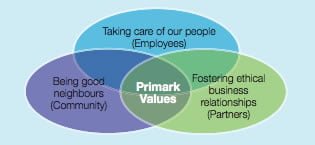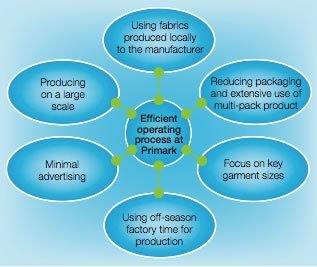
Rapid changes in media, transport and communications technology have made the world economy more interconnected now than in any previous period of history. Nowhere is this more evident than in the world of textile manufacturing and clothing distribution. Consumers want fashionable clothes at affordable prices. Much of high street fashion is produced in various countries across the world. Businesses source clothes from countries like India, China, Bangladesh and Turkey because of lower material and labour costs in these countries. In order to meet consumer demand, Primark works with manufacturers around the world.
Primark is part of Associated British Foods (ABF), a diversified international food, ingredients and retail group. Primark has almost 200 stores across Ireland, the UK, Spain, Netherlands, Germany, Belgium and Portugal. Primark”s annual turnover accounts for a significant proportion of ABF”s revenues and profit.
Primark’s target customer is fashion-conscious and wants value for money. Primark can offer value for money by:
- sourcing products efficiently
- making clothes with simpler designs
- using local fabrics and trims
- focusing on the most popular sizes
- buying in volume
- not spending heavily on advertising.
Primark”s business growth comes from meeting these customer needs whilst continuing to expand stores and move into new markets.
This case study shows how Primark sources the clothes it sells in its shops in an ethical and fair way, often at added cost to itself.
What are business ethics?
Business has a responsibility to society. Business ethics are rules of conduct and principles and patterns of behaviour in business dealings that involve ‘doing the right thing’. Part of this responsibility is to look after the wider community involved in the business process, including employees, across the globe.
Primark works with many third party suppliers and has a key concern to source ethically. Primark is very clear about where it stands on business ethics. ‘As an international brand with a global supply chain, we have a responsibility to act ethically. We embrace this responsibility as an opportunity to be a great force for good. Primark is committed to providing the best possible value for our customers, but not at the expense of the people who make our products.’ In other words, this means making sure that, throughout the supply chain, Primark’s goods are manufactured under good conditions and the employees in those factories are treated well.
Values

Primark shares its values with its parent ABF. These values shape Primark’s relationships with its stakeholders. Stakeholders are individuals and groups who have an interest in or are affected by a business. They may be internal, such as shareholders or employees, or external, such as government or the community.
Important business principles for Primark include respecting human rights and setting guidelines for appropriate conditions of employment in its suppliers’ factories. Primark has over 600 major suppliers in 16 countries. These companies provide employment for over 700,000 workers in three continents. Primark is committed to making sure that its partners, both factories and suppliers, also act responsibly towards their employees.
Typically, textiles are manufactured in low-wage/high manual skill economies such as are found mostly in the developing world. Factories in countries such as India or China may supply a range of retailers and brands, producing goods according to each individual retailer’s specifications. In these circumstances, the factory sets the same wage rate to employees, regardless of which retailer the goods are for. At least 95% of the factories supplying Primark also produce for other high street retailers.
Ethical supply
Primark works to ensure ethical sourcing in a number of ways. It has an Ethical Trade Director, whose role is to make sure Primark goods are sourced ethically and who leads a team of ethical managers and executives based in the key sourcing countries. Primark is a member of the Ethical Trading Initiative (ETI). The ETI is an international alliance of companies, trade unions and nongovernmental organisations (NGOs) working in partnership to improve the lives of workers across the globe.
Economies of scale

Primark is able to offer value and low prices because its business model is based on high sales volumes and lower retail margins with minimal advertising. The company keeps costs down by buying large quantities of items and enjoying the economies of scale resulting from buying in bulk. In addition, retail prices are kept low through lean production and efficient operational practices. For example, using off-season factory time for production means that the costs are lower than at peak time. This is good for Primark, but it also means factory employees get work and pay when they might not otherwise have been needed. Therefore, its practices are both efficient and ethical at the same time.
Ethics in practice
A company needs to be constantly alert to the challenges of operating ethically. It needs to develop ethical practices and principles that are supported and adopted throughout the business and to work in partnership with the many industry and international bodies seeking to secure ethical practices and protect the rights of employees.
Code of Conduct

Primark bases its Code of Conduct on the International Labour Organization’s (ILO) Code. The ILO is an agency of the United Nations. It brings together representatives of governments, employers and workers to shape policies and programmes. This unique arrangement enables the ILO to incorporate ‘real world’ knowledge about employment and work. The ILO code describes a set of standards for international labour. These promote opportunities for women and men to work in freedom, equity, security and dignity.
Primark’s Code of Conduct is translated into 26 languages, all published on its website, to ensure clear communication on standards. The Code of Conduct sets out the company’s policy and is part of its legal terms and conditions. See the full Code and additional detailed information on the 11 points of the code on the Primark website
The code states that within its supply chain:
- Employment is freely chosen
- Freedom of association and the right to collective bargaining are respected
- Working conditions are safe and hygienic
- Environmental requirements – Primark shares its commitment with suppliers
- Child labour shall not be used
- Living wages are paid
- Working hours are not excessive
- No discrimination is practised
- Regular employment is provided
- No harsh or inhumane treatment is allowed
- Legal requirements – Primark is committed to compliance of all countries” laws.
Working with suppliers
Primark works closely with the suppliers and factories that produce its goods. It provides training for suppliers, factories and its own buyers so that they understand ethical issues. For example, it offers guidance on issues such as child labour and home working in Asia, as well as immigration and right to work issues in the UK.
The role of Primark buyers is important in helping to support ethical business practices. When selecting new suppliers and factories, Primark requires them to go through a selection process. This enables Primark to establish if working conditions are appropriate or if improvements are necessary before the supplier can be approved.
Auditing and compliance
All Primark suppliers are also subject to thorough independent audits and follow-up visits to make sure that the supplier is maintaining ethical practices. This involves an audit of labour standards. An auditor is someone that checks factories to ensure that Primark’s code of conduct is being implemented within the factory. This includes, for example, checking that the factory has the appropriate fire safety equipment and that staff have been trained how to use it, to ensuring that all employees receive the wages and benefits they are entitled to.
Primark seeks to work collaboratively with its suppliers when auditors identify issues of non-compliance against the code of conduct. Often factories need support and training to implement changes to their factories that are permanent and effective.
Why take an ethical approach?
As with most businesses, Primark’s main objective is to be a profitable and sustainable business. Consequently, it is always seeking opportunities for profitable growth to ensure these primary objectives are achieved year-on-year. At the same time, Primark is committed to acting as a responsible corporate citizen. The term Corporate Social Responsibility (CSR) describes this approach.
When a company operates in a responsible way, for example, through conducting ethical audits and working in collaboration with its suppliers to address issues, it helps to:
- build confidence in the brand. The reputation of the business grows; stakeholders are pleased to be associated with it.
- reduce risk to the business, for example, from poor publicity about ethical issues.
Sustainability

Good business practice involves being sustainable over the long term. A business is sustainable when it is able to make profits for shareholders, offer good employment opportunities for its staff, pay taxes to the governments of countries in which it operates, and at the same time give consumers what they want (e.g. products that represent good value for money at affordable prices). A business that makes a profit is able to make an important contribution to society and to look after all of its stakeholders.
The costs of ethical behaviour

Operating in an ethical way may incur additional costs to a business when compared with other retailers and companies who may not do business in the same way. For example, Primark bears the cost of carrying out all audits. Then there are its costs associated with working with ethical partners. An example of this is Primark”s partnership with Nari Uddug Kendra (NUK). This is an organisation supporting women’s rights and health in Bangladesh. See more information and read an interview with NUK on the Primark website.
NUK has more than 20 years experience in addressing women’s rights and labour issues in the ready-made garment sector in Bangladesh. Through this partnership, Primark seeks to identify and address key issues around equal rights, opportunities for growth and career enhancement, as well as training needs within some of its key suppliers in Bangladesh. NUK’s expertise in this area helps Primark provide employees and middle management at factories with more intensive support and training on ethical issues.
Costs to Primark of working in an ethical way include:
- the employment of the global Ethical Trade team
- training its buyers on all ethical trade issues
- managing and paying for external audits
- helping suppliers put right issues raised by audits, through training and support from the Primark Ethical Trade team.
However, rather than seeing these activities as costs, Primark believes that they enable the business to operate in a sustainable and well-managed way. Through its remediation programme, Primark’s team of ethical managers work with factories to help them find ways of putting issues right and developing sustainable practices. This provides a benefit to the supplier but also in the long term to Primark, who gains from having suppliers all working to its standards.
Transparency in business
Transparency is an important part of this process. Transparency means the business is open to people seeing how it manages its relationships with suppliers. In turn, suppliers” practices also need to be transparent. The alternative would be for an organisation to ignore ethical behaviour. However, this would rapidly lead to a decline in brand reputation and consumers could move to purchasing from competing retailers behaving more ethically. Operating in the ‘right way’ is therefore not just appropriate for ethical reasons, but is also good business practice.
Conclusion

Primark is an exciting, growing brand that provides consumers with value-for-money fashion items. The company has an effective supply chain, bringing together manufacturing units in China, India, Turkey, Bangladesh and other countries, with retail outlets in Ireland, the UK and other parts of Europe.
A key principle of Primark”s business practice is to make sure that it provides its consumers with value-for-money garments, whilst maintaining ethical manufacturing standards. This involves paying for independent audits of all its factories and working with suppliers to address issues in a sustainable manner.
By working with external agencies such as the International Labour Organization, the ETI and independent auditors, Primark helps to set and maintain standards. Its auditors work with suppliers over a period of time to help them meet the exacting standards set out by the Ethical Trading Initiative. This enables the supplier to become approved. Primark sees this as a programme of continuous improvement.
By making its Ethical Trade processes transparent, Primark aims to demonstrate its commitment to responsible manufacturing. This helps to assure its customers that the goods they are purchasing are not only fashionable and good value-for-money, but also that they are ethically produced by workers who are fairly treated.
